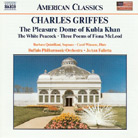July 2004
 Charles Tomlinson Griffes (1884-1920), like Mozart, died in his 36th year, but
the composer more frequently invoked in discussing him is Schubert, who died even younger;
reference is made frequently to Franz Grillparzer’s epitaph for Schubert: "Here
music has here entombed a rich treasure, but even fairer hopes." While Griffes
approached neither Mozart nor Schubert in the sheer volume of his compositions, he did not
go unrecognized in his own time. Pierre Monteux introduced his music in Boston, and
Leopold Stokowski did in Philadelphia. Memorial tributes were signed by those two
conductors and by such figures as Sergei Prokofiev, Frank Damrosch, Harold Bauer, Eva
Gauthier, John Alden Carpenter, Rudolph Ganz, and the members of the Flonzaley Quartet. A
"Griffes Group" was organized to perform his music (and that of other American
composers). Within 30 years of his death, however, his name was kept alive (barely) by one
song and three brief instrumental works, and even these were more likely to be encountered
on records than in live performances. Charles Tomlinson Griffes (1884-1920), like Mozart, died in his 36th year, but
the composer more frequently invoked in discussing him is Schubert, who died even younger;
reference is made frequently to Franz Grillparzer’s epitaph for Schubert: "Here
music has here entombed a rich treasure, but even fairer hopes." While Griffes
approached neither Mozart nor Schubert in the sheer volume of his compositions, he did not
go unrecognized in his own time. Pierre Monteux introduced his music in Boston, and
Leopold Stokowski did in Philadelphia. Memorial tributes were signed by those two
conductors and by such figures as Sergei Prokofiev, Frank Damrosch, Harold Bauer, Eva
Gauthier, John Alden Carpenter, Rudolph Ganz, and the members of the Flonzaley Quartet. A
"Griffes Group" was organized to perform his music (and that of other American
composers). Within 30 years of his death, however, his name was kept alive (barely) by one
song and three brief instrumental works, and even these were more likely to be encountered
on records than in live performances.
If we did get Griffes’s orchestral masterwork, The Pleasure-Dome of Kubla Khan, in concerts, it was likely to be with cuts made by Frederick Stock when he conducted the piece in Chicago shortly after the Boston premiere under Monteux. It was with Stock’s cuts that the work was initially published, and thus that Eugene Ormandy, back in his Minneapolis days, and Howard Hanson recorded it. Seiji Ozawa restored the cuts when he recorded Kubla Khan and other Griffes works for New World in the mid-1970s; Gerard Schwarz followed suit in Seattle for Delos, and it is in the full uncut version the work is likely to be performed nowadays -- as it is by the Buffalo Philharmonic on this very attractive Naxos CD, the richest harvest of Griffes’s orchestral works yet to appear in a single package. It is fully competitive with its too few predecessors -- and why not? The Buffalo orchestra has a rich history under such distinguished music directors as William Steinberg, Josef Krips, Lukas Foss, Michael Tilson Thomas and Semyon Bychkov, and its current m.d., JoAnne Falletta, is not only a highly competent conductor but, on the aural evidence here, one particularly suited to this specific assignment by virtue of real understanding of and enthusiasm for the Griffes idiom. In addition to her expansive, evocative reading of Kubla Khan, we have The White Peacock, the Bacchanale, Clouds, Three Tone Pictures, the Poem for Flute and Orchestra (with the excellent Carol Wincenc), and the song cycle Three Poems of Fiona McLeod (with the soprano Barbara Quintiliani, who sang this work with the same associates at Carnegie Hall last month, and whose feeling for it is no less evident than Falletta’s). As these various titles may suggest, extra-musical influences, and poetry in particular, are prominent in Griffes’s music, much of which is frankly descriptive, or "impressionistic" in character. An especially strong literary influence was the poetry of William Sharp, most of whose work was published under the pseudonym Fiona McLeod: Griffes set several of the poems, and based instrumental pieces on others. (The wholly instrumental Three Tone Pictures, however, were inspired by poems of Yeats and Poe.) Today this music sounds no more "dated" than the masterworks of Debussy and Ravel. Debussy’s own Clouds (in his orchestral Nocturnes) preceded Griffes’s by only a few years; each distinctively identifies its own composer. Like Ravel, Griffes orchestrated some of his own piano pieces: the Bacchanale was originally the final number in a set of Fantasy Pieces for piano, and both The White Peacock and Clouds were among the four Roman Sketches, a piano suite inspired by Sharp’s poems. The documentation here is not elaborate, but Edward Yadzinski manages to get all the essential background into a small space. What is regrettable is that texts are not provided for the songs; that is the only regret, however, and it is largely offset by the strong performances, fine sound, and low price that add up to one of the most rewarding presentations so far in Naxos’s ambitious coverage of American music. I would regard it, in fact, as simply indispensable. GO BACK TO: |
 Charles Griffes -
The Pleasure Dome of Kubla Khan, The White Peacock, Three Poems of Fiona McLeod
Charles Griffes -
The Pleasure Dome of Kubla Khan, The White Peacock, Three Poems of Fiona McLeod